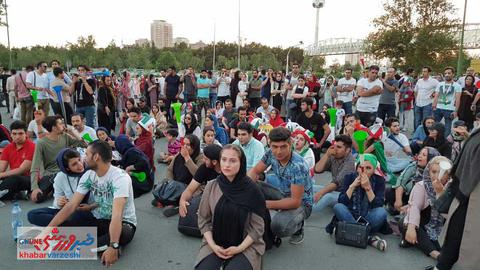They had painted their faces green, red and white, the colors of the Iranian flag, and some used the flag as a headscarf. Women waited alongside men outside the gates of Tehran’s Azadi Stadium for hours. Not only was it the first time that a televised international football game was shown on the gigantic monitor inside the stadium, it was the first time in a long, long while that both women and men were allowed to enter the stadium together.
Iranian women have been banned from entering stadiums to watch men’s football games (and other sports) for many years. During the ban, many have tried to enter stadiums on several occasions, and some have succeeded by posing as men. Every once in while, photographs of disguised women, sometimes wearing fake beards, pop up on social media and are widely shared. But this time, women were allowed inside the stadium as themselves, waving flags, shouting and jumping around while they watched the televised World Cup Iran-Spain game on the stadium’s big screen.
On Tuesday, June 19, the news was announced that the office of Tehran’s governor had issued a permit allowing the Iran-Spain game to be shown in the 100,000-seat Azadi Stadium, Iran’s biggest stadium. Tickets were available on the website Cinema Ticket, which informed the public that the gates would open at 7pm, and that before the game started, spectators would be entertained with a variety of programs. Prominent sports figures would also be present.
I spoke to a woman called Shayesteh. She did get into the stadium eventually, but at 7pm when she arrived at the stadium, she found the gates were closed. “The stadium was surrounded by the agents of the Police Special Unit, who were trying to disperse the people,” she said. “They said the event had been cancelled and the gates were locked.”
According to Shayesteh, a crowd sat on the ground outside the stadium to protest against the cancelation. Policemen were trying to disperse them too, telling them they better go home because they gates had been closed by order of Tehran’s prosecutor. “The crowd was very large and it was not easy to disperse them,” she told me. “They just went into the side streets. There was such a crowd and traffic that nobody could move away easily.”
Let History Know
“For historical record: Women and men sat together on the ground in front of the police to protest against them preventing families from entering the stadium,” tweeted a woman called Negar, who also posted a photo of men and women sitting outside the stadium, surrounded by police officers.
Shayesteh said her heart broke when she saw how people reacted. “They said people were not allowed to go in, and I witnessed a collective feeling of disappointment,” she said. “I pitied us because such small things make us happy and hopeful, but then so easily this little hope is taken away. A little girl who had painted her face was crying and my tears flowed too.” There was confusion as to who had ordered the cancelation, she said, and people on social media had conflicting reports.
The website Khabar (“News”) Online reported that the prosecutor had ordered the move, but Tasnim News Agency, quoting an official from the prosecutor’s office, denied this and reported that the order had come from the office of Tehran’s governor.
Hojjat Nazari, a member of Tehran City Council, posted a picture of a letter written by Tehran’s deputy police chief. It said the event at Azadi Stadium would go ahead. A tweet by Fatemeh Hosseini, a member of the parliament, claimed that Interior Minister Abdolreza Rahmani Fazli had said the sports ministry had informed the government in writing that if women and men attended the stadium together, it would guarantee people’s security.
“When they told us to go home, we paid no attention,” Neda, another woman who had gone to watch the game, told IranWire. “I was in the car and my brother kept blowing a horn and holding his head out the window as a sign of protest. The police took down his license plate number...we had the right to resist.”
The website Asr-e Iran published a photo of cars at a standstill in the streets leading to the stadium. It reported that police had noted down the license plate numbers of cars when people refused to go home.
The People’s Resistance
“It was the people’s resistance that opened the gate,” Shayesteh said. “The crowd was so large that all the streets were blocked. It was not possible to disperse them all and people were not willing to return home to watch the game.” According to Fars News Agency, around 20,000 people waited outside to be admitted into the stadium.
An hour before the game was due to start, the Police Information Center announced that the Iran-Spain game would be broadcast at the stadium “out of consideration for the people who have already purchased tickets.” Then the gates opened.
“Azadi [“freedom”] Stadium is free!,” tweeted Mahmoud Sadeghi, a reformist member of parliament, acknowledging the larger impact of what had happened. “When we have difficulty in solving the most insignificant problems, then we are the ones who are the problem.”
Neda, her mother and her brother, all of whom had purchased tickets, then entered the stadium. “Before the revolution, my mother had watched a game between Iran and Israel at Amjadieh Stadium,” she said. “Now she says she feels young again.”
The moment the game started, Neda tweeted a picture of herself at the stadium. She wrote: “We are here and we will be here again! Rights are not given, but taken.”
More on the ban of Iranian women from stadiums:
The Poet, the Woman and the Football Fan, December 31, 2017
Is Khamenei Afraid to Contradict Grand Ayatollahs?, December 13, 2017
Ayatollah Gives Thumbs Down to Women in Stadiums, December 12, 2017
Iranian Women Banned from “Freedom” Stadium — Again, September 6, 2017
"I Was There!": Defying the Ban on Women in Stadiums, February 17, 2017
The Girl Who Sneaked into Azadi Stadium, May 16, 2016
Women in Stadiums: The Ban Continues — Except for a Select Few, February 18, 2016
Iranian Women’s Rights Find Supporters in International Volleyball Games, July 18, 2014
Authorities Clamp Down on Women Sports Fans, June 17, 2014
visit the accountability section
In this section of Iran Wire, you can contact the officials and launch your campaign for various problems


























comments